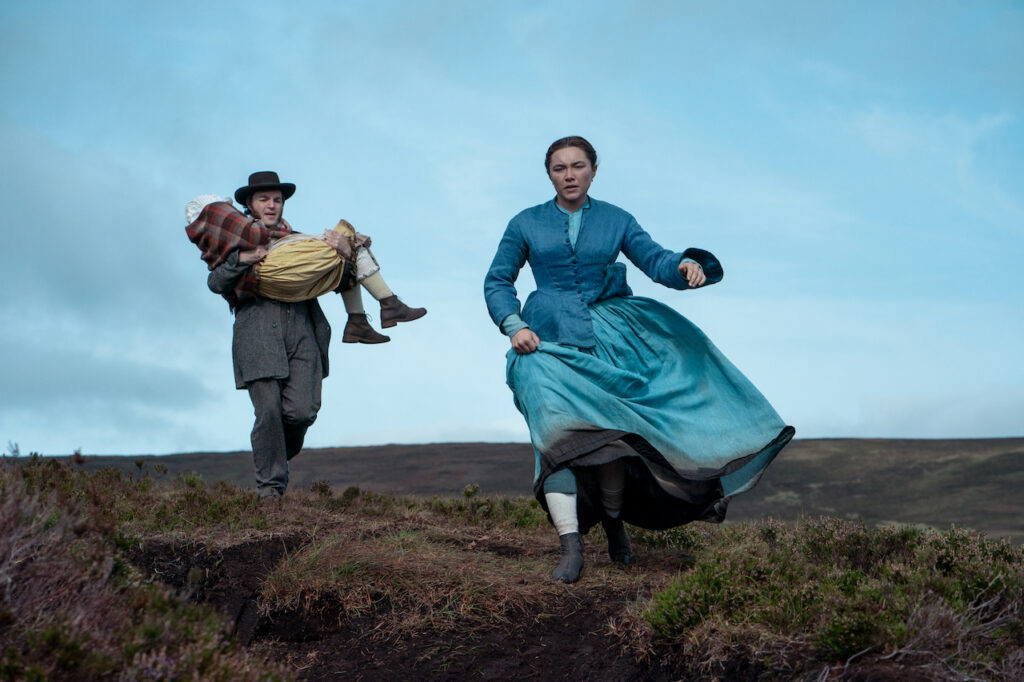
(***)
It’s a very simple story, at first. A modest allegory that pits religious fanaticism against common sense in a test of wills that slowly becomes biblical.
Ireland 1862, 13 years after the Great Famine of 1845/49 caused millions of deaths. Anna (Kíla Lord Cassidy), an 11-year-old girl living in the rural Irish Midlands, is seemingly the saint of her devout community. The Chosen. Her family claims she hasn’t eaten for four months, yet she walks, talks and shows no signs of stress or the dying process. A local all-male council hires and sends for Lib Wright (Florence Pugh, Little Women), an English nurse who tended to soldiers during the Crimean War. She will oversee a 15-day study to determine if the girl is surviving on God’s love, or not. The edict: “It’s not your job to question us. You are here only to watch.”
To Lib’s surprise, one of the pillars of the community, Sean Ryan (David Wilmot), states that a second guardian, a nun named Sister Michael (Josie Walker), will also observe the phenomenon. Their final report is due in two weeks and the council hopes the findings will verify this blessed occurrence. A nosy English journalist, Will Byrne (Tom Burke), also investigates “the miracle girl.” He and Lib seek the truth.
Producer Tessa Ross’s source material is Emma Donoghue’s 2016 novel The Wonder, which cuts across themes of religion, deification, child rights and women’s issues in ways that are old and new. Writer/director Sebastían Lelio and cowriters Donoghue and Alice Birch wrote an intense script that veers only slightly from the central plot of exposing a hoax or verifying a wonder. Tangents off that main story include a ruse and coverup, a romance between strangers and the dynamics of a nurse whose maternal instincts indicate something is wrong. That possibly a young girl’s stubbornness has backed her into a dark corner. Lib: “If Anna doesn’t eat, she’ll probably die.”
In the Victorian era, “fasting girls” were peculiar phenomena. They feigned an ability to not eat and yet thrive due to a miraculous act from God. A magical power. It’s likely that marvel back then is what’s now known as anorexia nervosa. E.g., in Wales a girl named Sarah Jacob claimed to have the fasting power. She died at age 12 in 1869 and her parents were convicted of manslaughter for not interceding. The real-life history of Anna’s situation adds urgency to Lib’s mission and gives the film a strong base.
This very primal tale unfolds against the backdrop of the vast Irish Midlands. Barren plains carpeted in earth tone colors, shades of greens and washed-out browns. A landscape so untouched it looks medieval. Grant Montgomery’s production design is as bleak as the surroundings. Art director Til Frohlich’s gloomy color palette eschews bright hues. One of the few hints of lighter tones is Lib’s pale blue dress (costume designer Odile Dicks-Mireaux), which perceptively has a brown ring of dirt on the bottom.
Earthy, pastoral scenes and cloudy skies are recorded in a storybook way (cinematographer Ari Wegner, The Power of the Dog). The footage is further enchanted by an absorbing musical score (composer Mathew Herbert, The Cave), which aside from typical ominous string music, features haunting whale crying sounds. Images of a burning house, a girl lying by a holy brook and stubborn old men sitting at a judgement table are indelible.
Chilean director Lelio (A Fantastic Woman) favors a minimalism that rarely features more than one or two characters on screen, few homes, near empty roads. Though fear, anger and deceit are on view, emotions are rarely peaked. It’s as if Lib is trying to rouse the dead and get them to see that a young girl’s life is at stake for the sake of religious pride. The drama is understated, but the risks and consequences are monumental. Lelio’s only questionable judgement is starting and ending the film in modern times, with a camera focused on a film studio. In those first moments a cryptic voiceover says: “We are nothing without stories… so we invite you to believe this one.” It’s an unnecessary device.
Pugh portrays the quintessential, mid-1800s Nightingale nurse. Kind, generous, helpful. Trying to sort out holy feats from hard realities. She fights the council, archaic beliefs and unconcerned parents, without hysteria but quite willfully. As the quest for saving Anna becomes more taxing and urgent, Pugh wears that stress on her face like a martyr.
Burke as Will, the other voice of reason, supports Pugh’s efforts adding a surprising chemistry between the two. Cassidy portrays Anna as a child in need of an angel. The entire group of stern heartless council members are well played by a frumpy cast: Wilmot, Ciarán Hinds, Toby Jones, Brian F. O’Byrne, Dermot Crowley.
A compelling drama shorn down to its essentials, both visually and emotionally.
On Netflix now.
Trailer: https://www.youtube.com/watch?v=htybz7XscIY
Visit NNPA News Wire Film Critic Dwight Brown at DwightBrownInk.com.